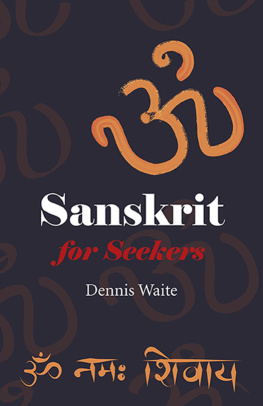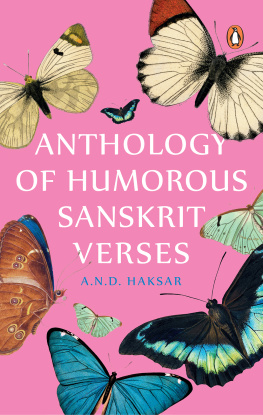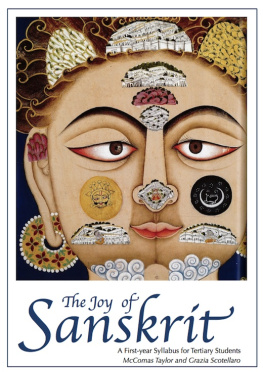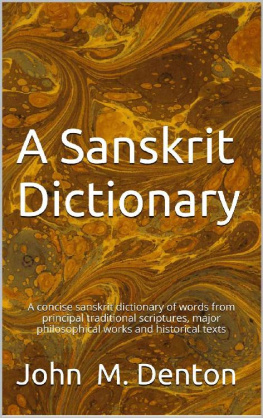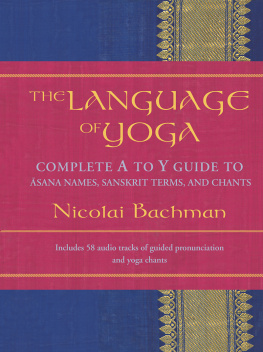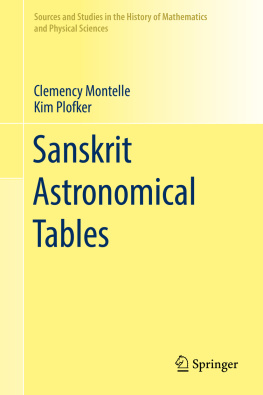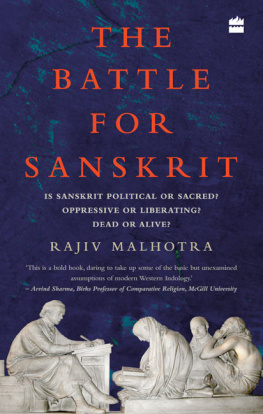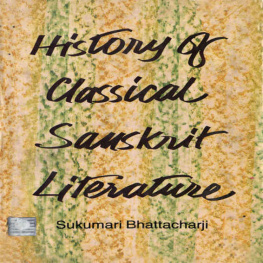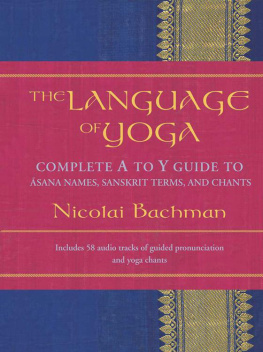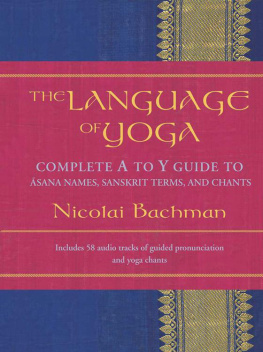Dennis Waite - Sanskrit for Seekers
Here you can read online Dennis Waite - Sanskrit for Seekers full text of the book (entire story) in english for free. Download pdf and epub, get meaning, cover and reviews about this ebook. year: 2014, publisher: Mantra Books, genre: Children. Description of the work, (preface) as well as reviews are available. Best literature library LitArk.com created for fans of good reading and offers a wide selection of genres:
Romance novel
Science fiction
Adventure
Detective
Science
History
Home and family
Prose
Art
Politics
Computer
Non-fiction
Religion
Business
Children
Humor
Choose a favorite category and find really read worthwhile books. Enjoy immersion in the world of imagination, feel the emotions of the characters or learn something new for yourself, make an fascinating discovery.
- Book:Sanskrit for Seekers
- Author:
- Publisher:Mantra Books
- Genre:
- Year:2014
- Rating:5 / 5
- Favourites:Add to favourites
- Your mark:
- 100
- 1
- 2
- 3
- 4
- 5
Sanskrit for Seekers: summary, description and annotation
We offer to read an annotation, description, summary or preface (depends on what the author of the book "Sanskrit for Seekers" wrote himself). If you haven't found the necessary information about the book — write in the comments, we will try to find it.
Sanskrit for Seekers — read online for free the complete book (whole text) full work
Below is the text of the book, divided by pages. System saving the place of the last page read, allows you to conveniently read the book "Sanskrit for Seekers" online for free, without having to search again every time where you left off. Put a bookmark, and you can go to the page where you finished reading at any time.
Font size:
Interval:
Bookmark:

My humble praNAms and congratulations for a fantastic work done. It is going to be useful as long as humans live on this earth.
Professor V. Krishnamurthy, well-known Advaita scholar
It is a pleasure to acknowledge Dennisjis labor of love and his trusting me with the task of making a few helpful hints along the way. As the Gita assures us, no good deed ever goes to waste, and even if human beings ignore this work, Dennisji will be blessed for it.
Sunder Hattangadi, moderator for Advaitin Elist, Sanskrit scholar
What a great work!
Alan Jacobs, president, Ramana Maharshi Foundation UK, and well-known author
This lovely book provides two levels of Sanskrit instruction. It is a wonderful guide to all those individuals that would like to know the basic Sanskrit religious vocabulary and how to read, write, and pronounce Sanskrit terms. The book introduces the transliterated Sanskrit alphabet and secondly, it teaches the Devanagari script/alphabet. The second level also teaches the main rules for combining Sanskrit letters and words which is often a headache for the beginner. Many examples are provided from the Hindu scriptures to illustrate these two levels of teaching. As well, there is a comprehensive glossary of the most commonly encountered spiritual terms. This useful book will appeal to all serious spiritual seekers interested in the Hindu scriptures and Sanskrit terminology. Its aim is to teach the reader so as to be able to look up Sanskrit words in a dictionary and to write and pronounce them correctly. I am sure that all beginners or even more advanced seekers of Hindu wisdom will find this a wonderful guide.
John Grimes, author of A Concise Dictionary of Indian Philosophy

First published by Mantra Books, 2014
Mantra Books is an imprint of John Hunt Publishing Ltd., Laurel House, Station Approach,
Alresford, Hants, SO24 9JH, UK
www.johnhuntpublishing.com
www.mantra-books.net
For distributor details and how to order please visit the Ordering section on our website.
Text copyright: Dennis Waite 2013
ISBN: 978 1 78279 227 7
All rights reserved. Except for brief quotations in critical articles or reviews, no part of this book may be reproduced in any manner without prior written permission from the publishers.
The rights of Dennis Waite as author have been asserted in accordance with the Copyright, Designs and Patents Act 1988.
A CIP catalogue record for this book is available from the British Library.
Design: Stuart Davies
Printed and bound by CPI Group (UK) Ltd, Croydon, CR0 4YY
We operate a distinctive and ethical publishing philosophy in all areas of our business, from our global network of authors to production and worldwide distribution.
I would like to dedicate this book to the memory of Peter Bonnici, a dear friend who died on 22nd June 2013. Peter carried out a thorough review of the first edition of this text and made many corrections and suggestions. These changes have improved the book very significantly.
So, why would you want to learn Sanskrit? Unless you are one of those fortunate few who have a genetic disposition for language learning or unless you are unfortunate enough to have a masochistic streak, why on earth would you want to tackle such an apparently formidable language? It shares with Latin the characteristic of having to change the ending of words depending upon the role of a noun or upon who is the subject of a verb and its tense. In fact, it is even worse than Latin. In Latin there is only singular and plural number, whereas Sanskrit has singular, two, and more than two!
It really must be almost impossible to learn this language unless you begin at school. I only wish that I had had the opportunity and studied it instead of Latin! Unfortunately, I didnt and its certainly too late to start now; I often have difficulty remembering what I read yesterday!
Before continuing, I may as well confirm the implied and appalling admission above: I know very little Sanskrit! I cannot construct sentences or even decline nouns or conjugate verbs. I can just about read the script. I can sometimes split words into their parts or put them together but would almost always have to refer to other sources for assistance in this. I could write the script, very clumsily, if I had to, providing I could refer to a list of the characters or to this book. But, lets face it, why would I want to? You need not just any italic pen, but one with a sloping nib, for goodness sake! With free software on the Internet to convert transliterated Roman characters into the Sanskrit script, there is not really any need. What then, you may justifiably ask, gives me the credentials (or temerity) to write a book about Sanskrit? Well, I hope that by the time you finish reading this short introduction, you will know and accept the answer. Basically, I was and to a degree still am in the same position that you are.
Sanskrit is a very beautiful language. You only need to look at the flowing, cursive, perfectly proportioned script to see this, even if you cannot yet even determine where one word ends and another begins. And, when you learn about some of its other peculiarities, you will appreciate this even more. For example, once you learn how to pronounce a particular letter, you will know how to pronounce it in every word you will ever encounter. There are not many languages which could make that claim!
Perhaps the most amazing aspect is the almost mathematical precision with which letters and syllables combine. One name that you will find invariably associated with the language is Panini he constructed a complex set of rules, which may be memorized through short sutras. These enable one to work out how to assemble words and syllables into sentences. So impressive and logical is this set of rules that NASA have apparently proposed it as the basis for a new computer language (see http://post.jagran.com/NASA-to-use-Sanskrit-as-computer-language-1332758613).
But none of this addresses the original question. What prompted you to pick up this book (and me to write it)? If it really is the case that you want actually to learn the language, then please put this book back on the shelf. There is an excellent two-volume work for learning the language written by Thomas Egenes (Ref. 6). What is more, Part 1 is available for free at http://www.scribd.com/doc/32874508/Introduction-to-Sanskrit-by-Thomas-Egenes so that you can try it out before committing.)
I suggest (hope) that your interest in this book comes from the fact that your actual interest is in Hindu scriptures such as the Upanishads and the Bhagavad Gita and maybe even the works of Shankara and other writers on non-duality. The fact is that, up until a few hundred years ago, all books and academic texts in India were written in Sanskrit. In this respect, it is similar to Latin in the West, except that Sanskrit is much more tenacious. Whereas Latin really could be said to be dead now, Sanskrit is still very much alive in the field of spiritual study. Although it is not really spoken any longer (apart from the odd commune-style efforts), it is still written. Even today, books are being published which are entirely in Sanskrit!
The point is that traditional teaching (certainly in the philosophy of Advaita, which is my own specialization) always refers back to the original scriptural texts for its authority. This is because those scriptures are the actual source of knowledge for key truths regarding the nature of reality and of ourselves. This knowledge is simply not accessible by any other means. We cannot
Font size:
Interval:
Bookmark:
Similar books «Sanskrit for Seekers»
Look at similar books to Sanskrit for Seekers. We have selected literature similar in name and meaning in the hope of providing readers with more options to find new, interesting, not yet read works.
Discussion, reviews of the book Sanskrit for Seekers and just readers' own opinions. Leave your comments, write what you think about the work, its meaning or the main characters. Specify what exactly you liked and what you didn't like, and why you think so.

